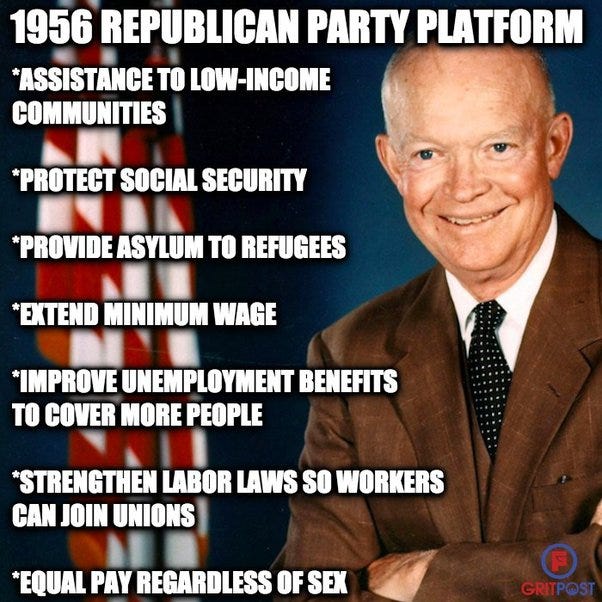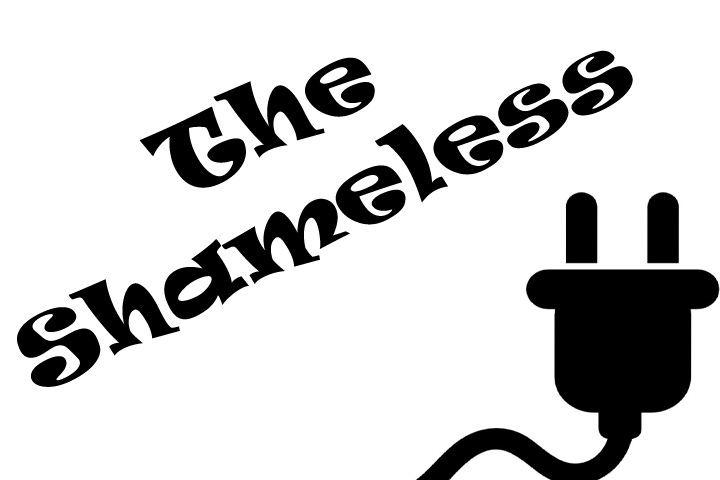Issue #321 American History May 16, 2023
It's crucial to keep in mind that the Republican Party (also known as the Grand Old Party or the GOP) has undergone a significant transformation from its 19th-century beliefs to its current stance. Today's article highlights the drastic changes.
In 1854, the Republican Party was formed by a coalition of anti-slavery activists, Northern Whigs, Free Soilers, and ex-Democrats who were discontented with the Democratic Party's pro-slavery stance. The party's first platform focused on opposing the expansion of slavery into new territories and states. In just six short years, the Republican Party's candidate, Abraham Lincoln, was elected as the 16th President of the United States.
Throughout the 19th century, the Republican Party had a strong commitment to emancipation and civil rights for African Americans. Key figures like Frederick Douglass, an escaped slave turned abolitionist, played an essential role in shaping the party's early ideology. The GOP was also known for its support of business and industry, which helped fuel the rapid economic growth of the United States well into the twentieth century.
In 1901, Vice President Theodore Roosevelt, at only 43 years old, ascended to the presidency after the assassination of President William McKinley.
As the 26th president, "T.R." was known for his progressive policies, such as breaking up corporate monopolies, regulating industry, and advocating for environmental conservation. His "Square Deal" sought to balance the interests of business, labor, and consumers, setting a precedent for future presidents to follow.
In 1932, Franklin Delano Roosevelt ("FDR"), 5th cousin to "T.R.," was elected as the 32nd president as a Democrat with a large Congressional majority. He immediately helped bring recovery to business and agriculture, relief to the unemployed and to those in danger of losing farms and homes, and reform, especially through the establishment of the Tennessee Valley Authority.
By 1935, Republican businessmen and bankers fought against FDR's programs, especially his concessions to labor. But FDR continued with his progressive policies to help ordinary Americans, including Social Security, higher taxes on the wealthy, new banking and utility controls, and large new work relief programs for the unemployed.
Please make sure to view and act on the important information at the end of this article to help support “We Are Speaking.” Thank you!
In the 1940s and 1950s, much of the Democratic Party, especially in the South, was still against racial equality and what they called the "socialist" programs of FDR and his New Deal. But a shift was coming.
Lyndon Baines Johnson (LBJ) was elected vice president with John Fitzgerald Kennedy (JFK) as president in 1960. Kennedy specifically chose Johnson as his running mate, first because Johnson's Protestant and Southern background was a good contrast to Kennedy's Catholic and Eastern background. Second, Johnson had an extensive record of political and legislative leadership in the Democratic Party.
Actually, unlike Obama and Biden and Biden and Harris, the partnership between Kennedy and Johnson was not a congenial one. They actually didn’t like each other very much.
When LBJ became president in 1963 after the assassination of JFK, he continued pushing the Democratic party towards civil and voting rights, social justice, and large social programs like the "Great Society," the Civil Rights and Voting Rights bills, and Medicaid.
By the late 1960s and 1970s, as the Democrats increasingly embraced the policies of LBJ, many conservative Southerners began to flock to the Republican Party.
People like Barry Goldwater and Ronald Reagan initially tried to steer the Republican Party towards limited government, low taxes, traditional family values, and a strong national defense. However, the racism of the former Southern Democrats brought to this new emerging Republican Party was just barely under the surface.
As a presidential candidate, Ronald Reagan, a former Democrat, made a states' rights speech on August 3, 1980, in Neshoba County, Mississippi, a location very near Philadelphia, MS where civil rights workers Chaney, Goodman, and Schwerner were murdered in 1964.
By 2010, the Tea Party movement emerged as a significant force within the Republican Party. This grassroots movement, driven primarily by concerns about government spending and the national debt, pushed the GOP further to the right on fiscal matters.
Photo Credit: Politico
More recently, the MAGA (Make America Great Again) movement, led by former President Donald Trump, has dramatically changed the direction of the Republican Party. Trump's populist, nationalist, and racist rhetoric resonated with many Americans who felt left behind by globalization and cultural change.
Trump and others who support him have promoted a paradigm of fear of the replacement of white people by the increased diversification of America and by the millions of recent immigrants from non-white countries.
Unlike in 1956 under President Dwight D. Eisenhower, in 2016 the Republican Party did not even promote a policy program at its convention. The party said that its platform was whatever Donald Trump said it was.
Today, the Republican Party primarily includes and endorses racist, anti-Semitic, nativist, anti-immigration, anti-LGBTQ+, anti-social justice, insurrectionist, and anti-government candidates and politicians.
Despite the efforts of prominent Republicans like Liz Cheney, Mitt Romney, and others to bring their members back to their pre-2010 policies and stances, the party is now known as the MAGA party and their extreme and fascist policies have become more and more mainstream.
As we look back on the history of the Republican Party, it is clear that its journey has been anything but linear. From its anti-slavery roots to the modern MAGA movement, the GOP's story is one of a complete turnaround and transformation.
This is not your grandparents' Republican party.
Do you have any thoughts about the major and massive changes in the Republican Party over the past more than 150 years?
Let us know in the Substack Notes feature.
You can always leave any questions in the comments or email us.
This article is free to access for 7 days after publication. Please consider becoming a paid subscriber for $5/month or less to access all of the articles and other benefits.
This is your chance to support everything Keith and Pam do. We appreciate you!
Purchase and download your copy of the “Branding And Marketing For The Rest Of Us” eBook for Independent Authors and Creative and Solo Professionals and other valuable eBooks.
Enroll in one of the 6-course bundles designed especially for you: “Author and Book Marketing” and/or “Essential Creative Marketing.”
Purchase your copies of “Detroit Stories Quarterly” issues.
What else do Keith and Pam do?
Where else can you find us?
Click the link below to learn everything you need to know and review everything we offer for independent writers and creative and solo professionals.










Your article was a pleasure to read. Up until your complete mis-characterization of the mindset of the MAGA movement. We are for the Jewish nation, because as believers in Jesus, we are told to protect Israel, which president Trump excelled at. We are not racist, and are excited to see Latinos and Black Americans flock to the Republican Party where we believe in the sanctuary of the nuclear family. We are pro-America, because it’s the greatest country in the world, and we welcome legal immigrants who have already helped shaped this country in countless ways into what we are today. We are fiercely protective of our children, and the right to raise them free of the government’s interference in the morals and values we as parents raise them with. We love our fellow Americans unconditionally and want them to be free from the dictatorship of the progressive yoke the New Democratic Party would put in them, by denying that women are women, and men are men, that babies unborn are somehow not human, and that being tied to a globalist agenda that negates our beloved constitution is somehow a good thing. We are vehemently opposed to socialism, the idea that we will “own nothing and be happy”, which is a blatant aversion towards the human experience of freedom to pursue life, liberty, and the pursuit of happiness. We don’t want to be told what to think and that the government knows best. We are the People, we created this government, not the other way around.